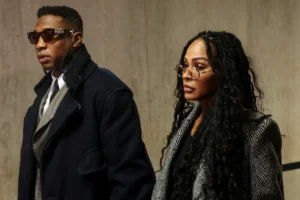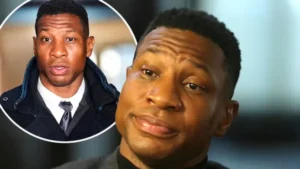Jonathan Majors, known for his roles in films like Creed III, found himself at the center of a highly publicized case that drastically altered the trajectory of his career.
Convicted of misdemeanor assault by a Manhattan jury in December, the 34-year-old actor faced the possibility of spending up to a year behind bars. However, during his sentencing on Monday, Judge Michael Gaffey opted for a different approach, considering Majors’ lack of prior criminal record and the agreement from both sides that jail time wasn’t warranted.
Jonathan Majors ordered to undergo therapy
Instead of imprisonment, Majors was ordered to undergo a year-long counseling program and continue with mental health therapy, a decision met with a sense of relief by his supporters. However, it wasn’t a total exoneration; Majors would face imprisonment if he violated the terms of his sentence, which also included a no-contact order with his former girlfriend, Grace Jabbari.

Accompanied by his girlfriend, actor Meagan Good, Majors appeared solemn in court, choosing not to address the judge or speak with reporters afterward. His lawyer, Priya Chaudhry, explained that Majors refrained from making any public statements to avoid potential repercussions in Jabbari’s civil lawsuit against him.
Chaudhry emphasized Majors’ commitment to personal growth, stating that he would approach the court-mandated programs with sincerity, despite maintaining his innocence and planning to appeal. She expressed the toll the case had taken on Majors, describing it as the most challenging year of his life, especially considering the impact on his career.

However, Jabbari, visibly emotional, painted a different picture in court, accusing Majors of refusing to acknowledge his guilt and posing a continued danger to others. She recounted her experiences of emotional manipulation and isolation during their relationship, highlighting the profound impact it had on her well-being.
Jabbari’s testimony stood in stark contrast to Majors’ assertion of innocence. She expressed concerns that he would repeat his actions and inflict harm on other women, believing himself to be above the law. Her account shed light on the power dynamics within their relationship, revealing a pattern of control and dependency.
Assistant District Attorney Kelli Galloway echoed Jabbari’s sentiments, criticizing Majors’ response to the court proceedings. Galloway cited his aggressive public relations tactics, including a nationally televised interview, as evidence of his refusal to acknowledge responsibility for his actions.
The consequences
The consequences of Majors’ conviction extended beyond the courtroom. Marvel Studios swiftly severed ties with him following the guilty verdict, resulting in the loss of his role as Kang the Conqueror, a coveted position that promised to shape his future in the entertainment industry.
The incident that led to Majors’ conviction occurred during an altercation last March, where Jabbari accused him of assaulting her in a chauffeured car. She detailed the physical violence she endured, alleging that Majors had struck her and caused injury.
Majors, however, offered a different narrative, portraying himself as a victim of circumstances. He claimed that Jabbari had become aggressive after discovering a text message on his phone, leading to a confrontation where he sought to defend himself and retrieve his phone.
Ultimately, Majors’ sentencing marked a pivotal moment in his life and career. While he avoided jail time, the repercussions of his actions and the ensuing legal battle would continue to reverberate in the months to come, shaping his path forward in unexpected ways
Jonathan Majors achieved widespread recognition with his breakout role in the 2019 film “The Last Black Man in San Francisco.” His talent further shone in the HBO horror series “Lovecraft Country,” earning him an Emmy nomination. Majors also took on the role of the formidable adversary to fictional boxing champion Adonis Creed in the blockbuster “Creed III.”
However, with his recent legal troubles and subsequent conviction, the future of Majors’ involvement with Marvel Studios hangs in uncertainty. As Marvel Studios faces the decision of whether to recast the role of Kang or pursue an alternative direction, the fate of Majors’ character remains unclear.












Comments 1